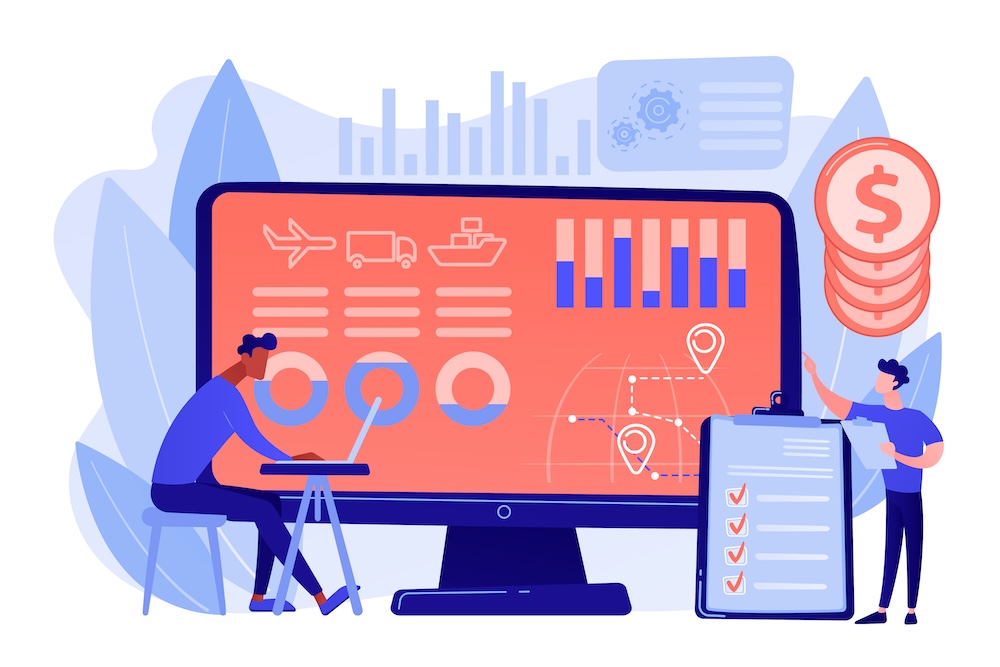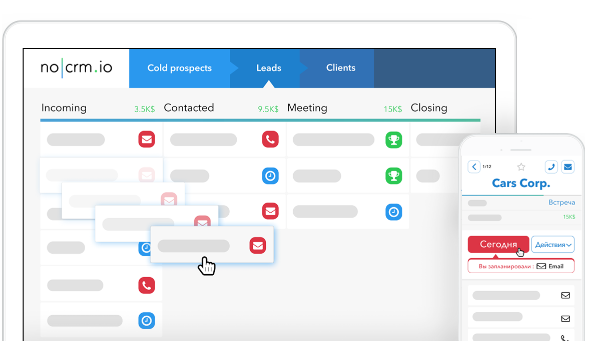
Sales has never been faster-paced or more highly competitive than it is today. With organizations constantly seeking innovative ways to enhance their sales strategies, it’s crucial that high-performing teams leave no stone unturned in their quest to gain a killer edge over their competitors. And one of the most valuable weapons in any team’s arsenal is information—or, more precisely, intelligence.
Sales intelligence (SI) refers to the collection, analysis, and application of data that helps businesses understand their prospects and customers more deeply, leading to more targeted and efficient sales efforts, both in the short-term and the long run.
It’s a huge topic, and can easily seem overwhelming at first. But the best way to understand sales intelligence is by getting a handle on how it goes beyond traditional sales techniques. By empowering sales teams with relevant data, sales intelligence can help reps refine their approaches, personalize their pitches, and ultimately close more deals.
So far, so good. But what exactly is sales intelligence, and how can businesses harness it effectively? That’s where we come in. In the following article, we’ll be taking a closer look at the concept of sales intelligence, as well as highlighting key tools that can drive your sales efforts forward. With that out of the way, let’s dive in!
Understanding Sales Intelligence
At the most superficial level, sales intelligence refers to the process of gathering comprehensive data and insights about a business’s potential prospects, customers, and competitors.
The ultimate goal of sales intelligence is to help sales teams make informed decisions, develop data-driven sales strategies, and execute targeted outreach. This intelligence can be used at every stage of the sales process, from lead generation all the way through to nurturing prospects and ultimately closing deals.
As an umbrella term, sales intelligence encompasses various types of information, including:
Customer Demographics and Behavior Patterns
Sales intelligence tools help companies gather data about the characteristics and preferences of their customers. This can include everything from age and location to purchasing habits and engagement levels, helping reps to hyper-personalize their approach and dramatically increase their chances of closing the deal at the end of the day.
Company Insights
For B2B sales, sales intelligence can provide crucial information about the target company. Some examples of these data points include their revenue, employee count, key decision-makers, and recent business activities (such as acquisitions, partnerships, or leadership changes).
Knowledge is power, after all, and the more of it you have in your back pocket, the better you’ll be able to speak to your target market.
Market Trends
As any sales professional knows, the market can shift at the drop of a hat these days. Understanding broader market trends, industry challenges, and competitor positioning is a crucial tool for sales professionals hoping to offer relevant solutions and services at all times, no matter what the broader landscape looks like.
Technology Stacks
This one might surprise you, but it’s true: many businesses use SI tools to track the technology stacks their potential clients use. Once you’ve got a handle on how your clients are running their own operations on a day-to-day level, you’ll be able to significantly improve your offer if you’re selling tech products or services.
Understanding the problem is often half the battle in sales, if not more—and having that deeper insight into the stack your potential customers are working with can often make all the difference when it comes to getting a deal over the line.
Why Sales Intelligence Matters
Long gone are the times when a Rolodex and a positive attitude was all you needed to excel in the realm of sales, whether it’s direct to consumer or B2B. With the recent explosion in technological tools, sales intelligence has become an essential element of modern sales strategies for several reasons:
Personalization at Scale
As you’re no doubt already aware, today’s customers expect personalized interactions. With sales intelligence, companies can tailor their outreach and offers to meet individual customer needs, increasing the chances of conversion.
Efficiency and Focus
Sales teams often waste precious time and energy pursuing leads that aren’t a good fit. By prioritizing leads that are most likely to convert based on data-driven insights, sales intelligence tools can improve overall productivity and seriously reduce the resources your team spends on dead-end prospects.
Improved Forecasting
Sales intelligence provides sales teams with insights that can enhance forecasting accuracy, allowing them to predict future trends, customer behavior, and sales outcomes more reliably. This is helpful at both the micro-level (understanding your process’s effectiveness on a shorter time frame) as well as the macro-level (making sizable shifts in strategy or pivots in order to address shortfalls or double down on successful efforts).
Competitive Advantage
With real-time data on competitors, sales teams can adjust their strategies to stay ahead. Sales intelligence tools often track competitor activities, helping organizations identify opportunities for differentiating themselves from the competition and standing out from the crowd.
Key Components of Sales Intelligence

While the concept of sales intelligence encompasses many aspects, there are several key components that sales teams should focus on to ensure they maximize the value of this powerful resource:
1. Lead Generation and Qualification
Sales intelligence tools can help generate high-quality leads by providing detailed information about potential customers. That’s not all, though—these tools can also help qualify leads by providing insights into their buying intent and fit for the business. And because they can do this at a scale humans simply can’t compete with, the potential for exponential efficiency improvements is enormous.
2. Customer Profiling
Sales intelligence provides deep-dive insights into customer demographics, behavior, and preferences. By creating detailed customer profiles, sales teams can better understand who their ideal customers are and what they are looking for. The tools don’t have to do this on their own, and probably shouldn’t. Adding a human touch to guide the machines behind the magic is a much more effective strategy for getting the most bang for your informational buck.
3. Buyer Intent Data
This one might sound a little sci-fi, but believe us: the future really is here. Today’s sales intelligence tools can actually track online behaviors and interactions to reveal buying intent, helping sales teams to figure out when a prospect is actively researching similar solutions—which is, of course, the perfect time to engage and reach out with your own offering.
The Best Sales Intelligence Tools

Now that you’ve (hopefully!) got a clearer understanding of what sales intelligence is and how important it can be to a modern sales team, the next step is identifying the perfect tools for effectively harnessing the power of SI. This is a search that can quickly seem like looking for a needle in a haystack. With so many options available on the market, each offering different features and benefits, it can quickly get overwhelming. That’s why we’ve decided to provide a brief, non-exhaustive list of some of the leading sales intelligence tools that businesses can use to enhance their sales efforts.
By the way, the best tools integrate with your CRM. And if you’re looking for a flexible, user-friendly CRM that won’t take weeks to set up and months to train your team on, noCRM might just be the answer you’ve been searching for. Designed to make salespeople’s lives as easy as possible, noCRM’s wide range of integrations and automation features make it the ideal choice for distributed sales teams hoping to gain a competitive edge over the rest of the market.
1. ZoomInfo
ZoomInfo is one of the most widely recognized sales intelligence platforms in the market. By providing detailed information on millions of companies and contacts, it’s become known as a go-to tool for lead generation and prospecting. ZoomInfo works by aggregating data from various sources, and the insights it provides into company hierarchies, key decision-makers, company revenue, technologies in use—and much more—are second to none.
Key Features:
- Comprehensive B2B contact database
- Advanced search filters for targeted lead generation
- Real-time buyer intent data
- Integration with popular CRM platforms
2. LinkedIn Sales Navigator
LinkedIn is probably the single biggest name in terms of online business tools, so it’s no surprise it features here. The company’s Sales Navigator suite is a powerful sales intelligence tool that leverages LinkedIn’s vast professional network to help sales teams identify and engage with the right prospects. Users can build and nurture relationships by leveraging in-depth insights into prospects, their connections, and their company activities.
Key Features:
- Advanced lead and company search capabilities
- Custom lead recommendations based on your preferences
- InMail messaging to contact leads directly through LinkedIn
3. Clearbit
Clearbit is a data enrichment platform that helps businesses enhance their existing customer and prospect databases. By integrating with CRM programs, Clearbit pulls in additional information about leads, including company size, industry, and technology usage. This enriched data allows sales teams to better segment their leads and personalize their outreach efforts.
Key Features:
- Data enrichment for contact and account records
- Real-time updates on leads and customers
- Technology and company insights for targeted prospecting
4. Datanyze
Datanyze specializes in helping tech companies understand the technology stacks of their prospects. By identifying the tools and software that a company uses—and making some educated guesses about the problems they’re likely to be facing—sales teams can craft more relevant pitches, especially when selling tech products or services. Datanyze also offers insights into company size, revenue, and key decision-makers.
Key Features:
- Technology stack insights for targeted outreach
- Contact information for key decision-makers
- Real-time alerts on company activities
7. Lead411
Lead411 is an interesting one: it provides sales teams with verified contact information, company insights, and real-time trigger alerts. Focusing on flexibility and the ‘move fast and break things’ perspective that’s so effective in today’s business environment, the platform is designed to help sales teams quickly identify prospects that match their target criteria and reach out to them at the right time. To that end, Lead411 offers features like email verification, direct-dial phone numbers, and real-time intent data.
Key Features:
- Verified contact information for accurate outreach
- Real-time sales trigger alerts
- Intent data to identify prospects actively seeking solutions
8. Lusha
Lusha is a simple yet powerful sales intelligence tool that provides accurate prospect information, including email addresses and direct phone numbers. Offering integrations with platforms like LinkedIn and Salesforce to streamline lead generation and outreach efforts, Lusha is particularly popular among smaller teams for its ease of use and affordability.
Key Features:
- Accurate email addresses and direct phone numbers
- Chrome extension for quick access to contact data
- Affordable pricing options for small businesses
Choosing the Right Sales Intelligence Tool for Your Business
When selecting a sales intelligence tool, it’s important to consider the specific needs and objectives of your sales team. Here are a few factors to keep in mind:
Data Accuracy and Quality
The success of sales intelligence depends on the accuracy of the data provided. Look for tools that offer high-quality, regularly updated data to ensure your sales efforts are targeting the right prospects.
Ease of Use and Integration
The best sales intelligence tools seamlessly integrate with your existing CRM and sales platforms. Ease of use is also crucial—your team should be able to access the data quickly and easily without a steep learning curve.
Customization and Flexibility
Different businesses have different needs when it comes to sales intelligence. Choose a tool that allows you to customize searches, set up alerts, and tailor the data to your specific requirements.
Cost
It’s not the most fun thing to think about, but it’s an important consideration nevertheless. It’s vital that you keep an eye on your budget when selecting a sales intelligence tool. Some platforms offer more comprehensive data and features, but come at a higher cost, making it imperative that you evaluate the ROI and potential impact on your sales pipeline before making an investment.
Conclusion
Sales intelligence is a critical component of modern sales strategies. By leveraging the right data and insights, businesses can improve lead generation, personalize customer outreach, and increase conversion rates. Whether you’re a small business looking for affordable tools like Lusha or a large enterprise needing comprehensive platforms like ZoomInfo, investing in sales intelligence can provide a significant competitive advantage.
At the end of the day, the art of closing more deals is a simple one—the secret lies in understanding your prospects better, and sales intelligence provides the insights needed to do just that.
FAQ
Sales intelligence (SI) involves collecting and analyzing data about prospects and customers to enhance sales strategies and improve targeting.
It enables personalization at scale, improves lead qualification, enhances forecasting accuracy, and provides a competitive advantage in sales.


